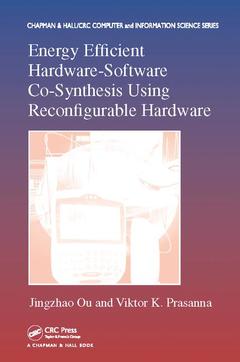Description
Energy Efficient Hardware-Software Co-Synthesis Using Reconfigurable Hardware
Chapman & Hall/CRC Computer and Information Science Series
Authors: Ou Jingzhao, Prasanna Viktor K.
Language: English
Subjects for Energy Efficient Hardware-Software Co-Synthesis Using...:
Keywords
Soft Processor; FPGA Device; Energy Performance Modeling; MicroBlaze Processor; energy efficient hardware; Power Consumption; hardware design; Hardware Peripherals; Jingzhao Ou; Low Level Implementations; Arithmetic Level; Simulink Block; Low Level Simulation; Co-simulation Environment; Co-simulation Process; Design Space Exploration; Hardware Software Co-design; Instruction Set Simulator; RTL; Energy Dissipation; CORDIC Algorithm; Virtex Ii Pro; Multiprocessor Platform; RTOS; Task Control Blocks; Co-simulation Technique; Hardware Accelerators; NRE Cost; Task T2
87.11 €
In Print (Delivery period: 14 days).
Add to cartPublication date: 06-2017
· 15.6x23.4 cm · Paperback
232.80 €
Subject to availability at the publisher.
Add to cartPublication date: 10-2009
352 p. · 15.6x23.4 cm · Hardback
Description
/li>Contents
/li>Readership
/li>Biography
/li>
Rapid energy estimation for energy efficient applications using field-programmable gate arrays (FPGAs) remains a challenging research topic. Energy dissipation and efficiency have prevented the widespread use of FPGA devices in embedded systems, where energy efficiency is a key performance metric. Helping overcome these challenges, Energy Efficient Hardware-Software Co-Synthesis Using Reconfigurable Hardware offers solutions for the development of energy efficient applications using FPGAs.
The book integrates various high-level abstractions for describing hardware and software platforms into a single, consistent application development framework, enabling users to construct, simulate, and debug systems. Based on these high-level concepts, it proposes an energy performance modeling technique to capture the energy dissipation behavior of both the reconfigurable hardware platform and the target applications running on it. The authors also present a dynamic programming-based algorithm to optimize the energy performance of an application running on a reconfigurable hardware platform. They then discuss an instruction-level energy estimation technique and a domain-specific modeling technique to provide rapid and fairly accurate energy estimation for hardware-software co-designs using reconfigurable hardware. The text concludes with example designs and illustrative examples that show how the proposed co-synthesis techniques lead to a significant amount of energy reduction.
This book explores the advantages of using reconfigurable hardware for application development and looks ahead to future research directions in the field. It outlines the range of aspects and steps that lead to an energy efficient hardware-software application synthesis using FPGAs.
Introduction. Reconfigurable Hardware. A High-Level Hardware-Software Application Development Framework. Energy Performance Modeling and Energy Efficient Mapping for a Class of Applications. High-Level Rapid Energy Estimation and Design Space Exploration. Hardware-Software Co-Design for Energy Efficient Implementations of Operating Systems. Concluding Remarks and Future Directions. References.
Jingzhao Ou works for the DSP Design Tools and Methodologies Group at Xilinx in San Jose, California.
Viktor K. Prasanna is the Charles Lee Powell Chair in Engineering and professor of electrical engineering and computer science at the University of Southern California.




